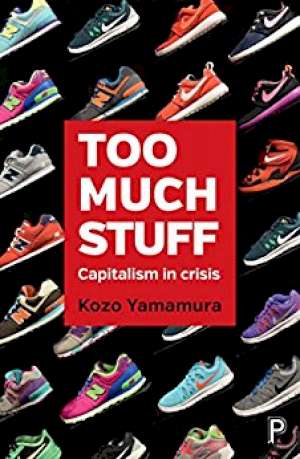11 July 2017
Too much stuff: Capitalism in crisis
Kozo Yamamura
2017, Policy Press, 224 pages,
Reviewer: Rebecca Harding, Delta Economics

Kozo Yamamura finds the source of capitalism’s malaise in the heart of developed world consumption patterns. In short, we consume ‘too much stuff’ at the higher end of the value chain. This ‘stuff,’ he argues, is a function of post-capitalism – it comprises goods and services that generations before now would have considered unnecessary but which we consider necessities. He calls these goods and services ‘necessary luxuries’ and argues that they are increasingly important as a proportion of GDP. However, and this is the crux of his argument, although they are proportionately more important as part of our total expenditures, the growth in consumption is not fast enough to compensate for slower growth at lower value, but more traditional, end of the value chain.
His argument is that the shift in consumption patterns towards these ‘necessary luxuries’ is causing income inequality and stagnation. It takes time and effort to convince people to buy new ‘stuff’ and alongside this, slow real wage growth, slow or negative population growth, and rise of emerging economies in the global trading system, have exacerbated trends toward slower growth in developed markets.
The other central concept he uses is that of ‘pro-investment’ policy. This is the simultaneous effect of fiscal policy aimed at lowering taxes for wealthy individuals and loose monetary policy. He points out that both are aimed at stimulating investment to fuel growth but that neither has been effective.
The result is that on both the demand side and the supply side of the economy, capitalism is failing. The principal policy recommendation, therefore, is that governments and decision-makers must recognise that capitalism has changed. Saturated markets and consumer demand for ‘necessary luxuries’ mean that traditional economic approaches will not work to create growth and in fact may make matters worse. He argues that we need a systemic overhaul of capitalism to provide adequate safety nets for individuals while ensuring that there is a capacity to grow. We need to ensure the democratic legitimacy of this ‘third’ approach to capitalism by combining growth and egalitarianism in a mixed system that is not necessarily ‘big government’ but allows the inequalities of capitalism to be ameliorated.
The ideas behind this book are good and there is little doubt that the failure of post-crisis monetary and fiscal policies globally has led to a disappointing pace of recovery. The focus on ‘necessary luxuries’ and loose monetary policy is very much reflective of the Japanese experience and while he attempts to assess the German and the US economies, there are real limitations to his approach. The US had a large fiscal boost post-crisis and the German economy’s growth since the crisis was based on labour market reforms that were implemented in the 1990s.
In short, there is much to recommend this book but it is something of a pastiche of different styles. The ideas at times are ‘lost in translation’ almost literally since the book appeared originally in Japanese. There are times when, in an attempt to be readable, the book skims over critical definitions that would help build a more robust structure to the argument. Nevertheless, the approach is interesting and thought-provoking, not least because the focus on consumption patterns is novel.
